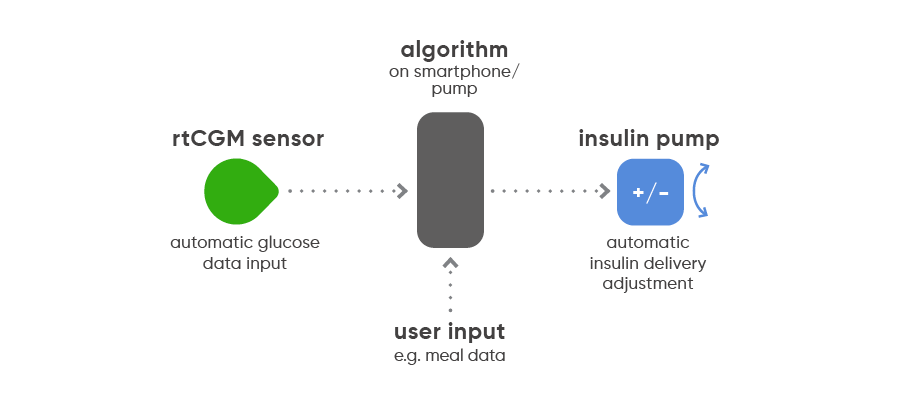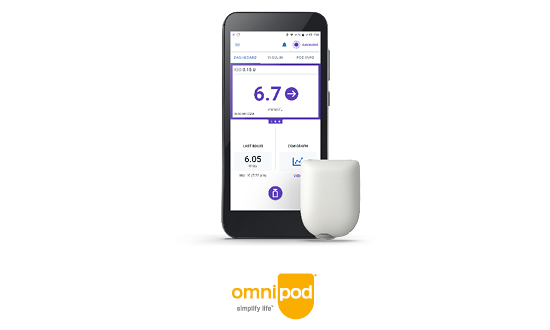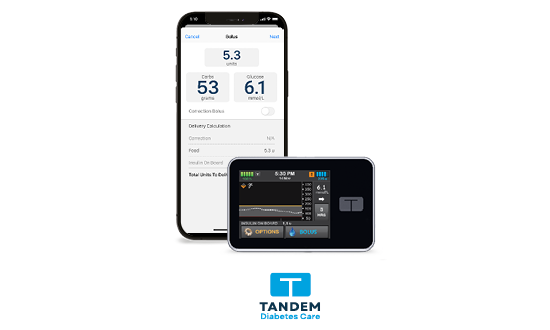
Hybrid Closed Loop (HCL) systems, also referred to as Automated Insulin Delivery (AID), are designed to mimic the activity of the pancreas.1
Combining knowledge of the body’s prevailing glucose level and where it's heading (supplied by a real-time continuous glucose monitoring, or rtCGM, system), with a digitally-controlled insulin pump, HCL systems automatically adjust insulin delivery to meet the changing needs of the user.
The flexibility to create an HCL system that revolves around their needs
Depending on circumstances, NICE recommends that people with type 1 diabetes start with a single piece of diabetes technology, such as rtCGM.2,3
And because Dexcom offer the only rtCGM systems to connect with an unparalleled choice of insulin pumps4, when you start them with Dexcom, you know you’ll be able to add on the right connected technology, whenever your patients are ready for it.
Take a look at some of the options available.

Omnipod® tubeless insulin
Omnipod® 5 offers the first tubeless insulin pump that integrates with Dexcom G6.

Tandem t:slim X2TM insulin pump
The Tandem t:slim X2TM insulin pump with Control-IQTM advanced hybrid closed loop technology syncs seamlessly with data from Dexcom G6 or Dexcom G7.
New connections are being created all the time
Now recommended by NICE
NICE recommends HCL technology for all people with diabetes meeting any of the following criteria:2
- Age 18 or under with type 1 diabetes
- Over 18 with HbA1c >7.5%
- Suffer from disabling hypoglycaemia
- Women who are pregnant or trying to conceive a baby
With an unrivalled wealth of clinical evidence
Given that Dexcom is the world’s most connected rtCGM family*,5, it’s no surprise that Dexcom has more HCL studies with more AID systems than any other CGM brand.†,6 In fact, Dexcom CGM has safely powered automated insulin delivery systems for over 1 million patient-years of cumulative use.7
Reducing HbA1c for 7 years and counting
One of the longest real-world outcome studies showed that people using rtCGM benefitted from significantly greater reductions in HbA1c compared to people using SMBG (self-monitoring of blood glucose), regardless of insulin delivery method. These reductions were sustained over 7 years of follow-up.8
Plus a recent systematic review of HCL use in people with type 1 diabetes identified the following outcomes:6
Increased time in range
Benefits in time in range that may lead to reductions in HbA1c and a reduced risk of diabetes complications.
No adverse impact on hypoglycaemia
HCL systems do not appear to be associated with increased rates of severe hypoglycaemia.
Improved wellbeing
Reduced mental burden that may contribute to improved psychosocial outcomes such as treatment satisfaction.
Is your team ready for HCL?
Explore our learning opportunities and discover all you need to know to get your service ready for increased volumes of patients using HCL technology.
Dexcom Education Hub
Your comprehensive resource for staying informed about diabetes care and technology, all in one place.
Here you’ll find CPD-accredited and practical education on CGM and its integration with insulin pumps and other connected technology, interpreting patient data, clinical evidence, and more.


HCL webinars
Developed with clinical experts at the Diabetes Technology Network (DTN) - our hybrid closed loop (HCL) webinars will quickly help you and your colleagues feel comfortable with the latest diabetes technology.
Discover essential knowledge on what HCL systems are and how they work, learn from case studies and tips on selecting the right tech for each patient, and explore insulin pump options.
*Dexcom G6 is the most connected CGM system available. Not all Dexcom systems have the same connectivity. Please check connectivity options at dexcom.com/en-gb/integrations-and-connectivity.
†There are over 30 studies on various AID systems powered by Dexcom.6
1 Hybrid closed loop systems for managing blood glucose levels in type 1 diabetes.
2 © NICE [2023] Hybrid closed loop systems for managing blood glucose levels in type 1 diabetes. [TA10845]. All rights reserved. Subject to Notice of rights. NICE guidance is prepared for the National Health Service in England. All NICE guidance is subject to regular review and may be updated or withdrawn. NICE accepts no responsibility for the use of its content in this product/publication.
3 Type 1 diabetes in adults: diagnosis and management. [NG17].
4 Dexcom, Data on file, 2023.
5 Dexcom, Data on file, 2022.
6 Peacock S, et al. Diabetes Ther. 2023;14(5):839–55.
7 Dexcom data on file, 2023.
8 [7 year Comisair data Ref Soupal J, et al. Comparison of Different Treatment Modalities in 7 years of follow-up in the COMISAIR study. Presented at EASD 2023, Germany].
.